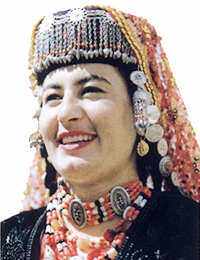 Standing at China's west gate in the eastern part of the Pamirs on the "roof of the world" is the Taxkorgan Tajik Autonomous County in Xinjiang. It is the place where the ancient Tajik ethnic minority has lived generation after generation. Most of the 33,583 (by 1990) Tajiks live in compact communities in Taxkorgan, and the rest are scattered over areas in southern Xinjiang, including Shache, Zepu, Yecheng and Pishan.
Standing at China's west gate in the eastern part of the Pamirs on the "roof of the world" is the Taxkorgan Tajik Autonomous County in Xinjiang. It is the place where the ancient Tajik ethnic minority has lived generation after generation. Most of the 33,583 (by 1990) Tajiks live in compact communities in Taxkorgan, and the rest are scattered over areas in southern Xinjiang, including Shache, Zepu, Yecheng and Pishan.
The Tajik language belongs to the Iranian Austronesian of the Indo-European Phylum. As a result of frequent exchanges with other nationalities, many Tajiks also speak the Uygur language and generally use the Uygur script for writing.
The origin of the Tajik ethnic minority can be traced to tribes speaking eastern Iranian who had settled in the eastern part of the Pamirs before 10th century BC. Between the second and third century, the State of Pantuo came into being in the Taxkorgan region in Xinjiang; the Pantuos were the ancestors of the Tajik nationality. In the 11th century, the nomadic Turkic tribes called those people "Tajiks" who lived in Central Asia, spoke Iranian and believed in Islam. In the 17th century, many Tajiks moved from the western and southern Pamirs to settle in Taxkorgan. The Tajik ethnic minority gradually expanded.
Stockbreeding is their main occupation, and arable farming a supplement. They pay great attention to etiquette. Juniors must greet seniors and, when relatives and friends meet, they will shake hands and the men will pat each other's beard. For saluting, men will bow with the right hand on the chest and women will bow with both hands on the bosom.
The Tajik people believe in the Shiah of Islam universally. They also worship eagles, the sun and fire. Many of their festivals are related to their belief.
The Tajik Spring Festival, which falls in March, marks the beginning of a new year and is the most important occasion for the Tajik people. The Baroti Festival takes place on the first two days in August of the Islamic calendar. On this day, every family will make a special candle. At dusk, the family members will get together, have a roll call and each will light a candle. The whole family will sit around the candles and enjoy their festive dinner after saying their prayers.
The Islamic Corban Festival, Almsgiving Festival and Kaizhai Festival are also important occasions for the Tajik people.
